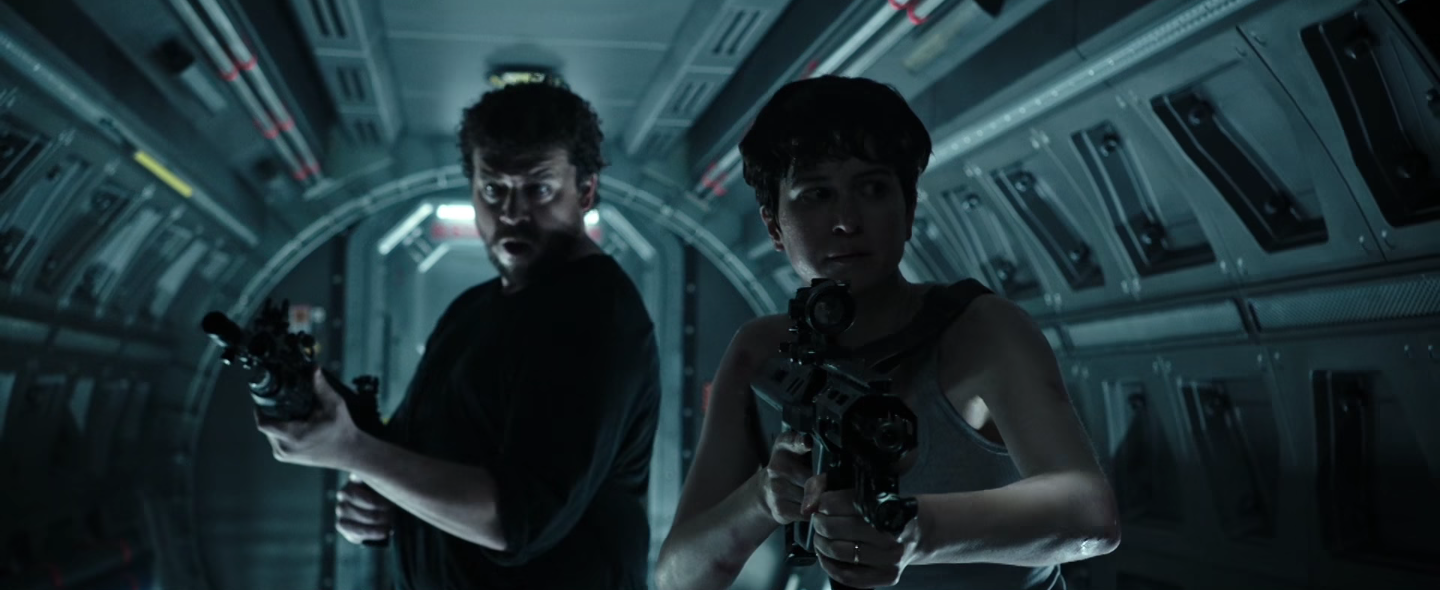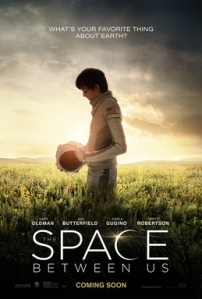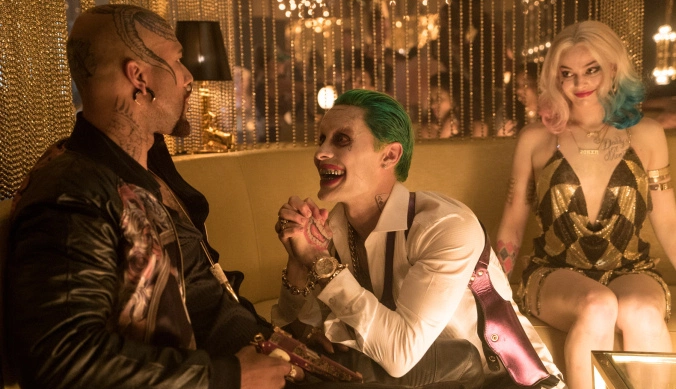
Alien: Covenant attempts to appease viewers by blending the big ideas of Prometheus with the familiar carnage of Alien
When Prometheus was released in 2012 it had high expectations to live up to. Would it answer the questions left by Alien? Who (or what) was the Space Jockey? From where did the titular creatures originate? Would aliens burst from various parts of the human body in new and disgusting ways? It answered these questions (in part), but also raised more, which left many viewers confused, angry, unhappy, or some combination of the three.
Now, five years later, Alien: Covenant (Alien is even in the title, which could be seen as Ridley Scott attempting to get back to the tent pole series’ roots as it gets closer to linking up with Alien, or a blatant marketing move to get fans of the original series in theater seats), attempts to appease both fans of the creationist and AI elements of Prometheus as well as the creature-feature, body horror ones of Alien.
I’m not so sure it succeeds.
Covenant takes place ten years after the events of Prometheus’s doomed expedition to find the origins of life on Earth, where a new colonization ship (for which the film is named) carrying with it 2000 cryo-sleeping colonists, embarks on a journey to terraform and build life on a new planet. Of course, being an Alien movie, nothing is going to go as planned. The crew picks up a rogue transmission from a nearby planet, similar in livability to Earth, and, to take their mind off a tragedy in the film’s opening minutes, decide to take a field trip to investigate.
I was one of the seemingly rare viewers who loved Prometheus upon initial viewing. I loved the focus on big ideas about creation and where we come from, the heroine in the form of Dr. Elizabeth Shaw, the twists, the memorable scenes (alien abortion, anyone?) and action set pieces, the breathtaking cinematography (I still look upon the first scene with awe), and the sense of wonder shared by the characters caused by exploring the things that make us curious. For fans of Prometheus’s big questions, this is what we’ve been waiting for, what was promised at the end of Prometheus: the home planet of the Engineers, the tall, pale, human-esque beings who seemingly created humanity and just as quickly decided to destroy it. Of course, it doesn’t take long for the ship’s crew members to touch what they should touch, disrespect what they should respect, and tread heavily where a lighter step would be wiser. And before they figure out what we already know, that this place is not safe, the aliens show up: bursting from backs, springing from throats, hugging faces. Here are the aliens, but where are the Engineers? What happened here? Where’s Shaw? Did she get the answers she was hoping for, ask the questions she was wondering?
As the crew of the Covenant encounter David, who we last saw as a head in a bag, some answers are revealed. Unfortunately, it’s here, at the foot of all that was promised at the end of Prometheus, that the film begins its falter from which it cannot recover.
The end of Prometheus seemed to promise further adventures with Dr. Shaw and David as they search for the Engineers and reasons for why they created—then tried to destroy—humanity. The ten years between the two films could have easily spanned the runtime of a film or two and what could have been an intriguing, suspenseful continuation, building on the philosophical elements introduced by Prometheus with characters in whom we’d already invested, is minimized into a few short minutes. Instead, the film seems too antsy and eager to focus on the film’s (and David’s, with his fully realized contempt for humanity and subservience) creations more recognizable to the franchise—chest-bursters, face-huggers, neomorphs, and other members of their blood-hungry extended family. Aliens are unleashed, crew members attempt to escape, carnage ensues.
I think that’s my real problem with the film. There’s no clear purpose, aside from Scott retreading the old formula (that some were hoping for with Prometheus, no doubt) of setting up characters to run from (and perish by) aliens in all their terrifying colors, shapes, and sizes. Without the desire to uncover or curiosity of Dr. Shaw, or the ulterior motives of Meredith Vickers and Peter Weyland, the film becomes a paint-by-numbers slasher (which isn’t all necessarily bad—the creatures are cool, after all; their appearance and movements realistic). There’s nothing for us to invest in, no mysteries to unravel, no curiosity to devote. Without this, the plot is too familiar and formulaic, things we’ve seen in this series before, and you can almost feel Scott checking off his boxes: chest-burster? Check. Face-huggers springing from eggs? Check. Fully-grown alien stowed away on a ship and stalking its last crew member(s)? Check.
Also lacking is a clear sense of suspense and nail-biting urgency. While there are visually interesting scenes, Scott seems to mistake quick alien attacks for suspense. At this point in the series, if we see an alien behind a human, we know it’s going to attack. We need exploration, characters to discover things the same time we do, to wonder, What’s going to happen next? or How are they going to get out of this? Not, In what cool ways will the crew be dispatched? Upon re-watching Prometheus, I was struck by how seamlessly everything blends together, how effortlessly security turns to dread which turns to fear, how the runtime flies by. Covenant’s focus is much more sporadic and unfocused.
Though Katherine Waterson gives a good performance as Daniels, she doesn’t have the same awe, relatability, or put-through-the-ringer sense of desperation and fight as Shaw (which makes it all the more disappointing that Shaw got the shaft here. They could’ve given her the same ending, had it been earned by spending another movie with her and David). As for the cinematography? Not entirely memorable (the film’s rainy, muted blue color palette grows a bit boring).
All of this makes it sound like there are no redeemable qualities to the film, which isn’t the case. The crew’s interactions during the first third seemed natural (bonus points to the script for giving them a believable motivation to explore the rogue transmission), as were the film’s subtle points about planetary disrespect and how no matter how clean and new something is, humans will always muck it up.
The scenes between David and newer model Walter were one of the best things about Covenant (thanks to the script and Michael Fassbender’s performance). I’m not sure what is says about the movie that the androids were more interesting than the humans, but these interactions mixed with David’s equally awesome and gross experiments proves we don’t need (the crutch of) aliens; we have a perfectly good antagonist in David. And it goes to show what good would come of this prequel series taking its time with the big ideas raised in Prometheus—AI, creation, our place in the universe—instead of rushing to feature the aliens and carnage we’ve already seen.
Alien: Covenant is just good, but it could have been so much better, especially after a five year wait. Many viewers complained about Ridley’s Scott’s focus on the philosophical and creationist elements of Prometheus, while only sprinkling it with the Alien DNA they’d grown up with (and had been expecting). Unfortunately, and to the disservice of Covenant, it appears as if he listened. Scott has said he could see the prequels going on for two, three, four-plus more movies. But if they’re to continue with the same formula—new ship, new crew, same alien carnage—I’m not sure I’ll be as excited to take the ride if the only difference is the same aliens bursting from new chests.
6.5/10






